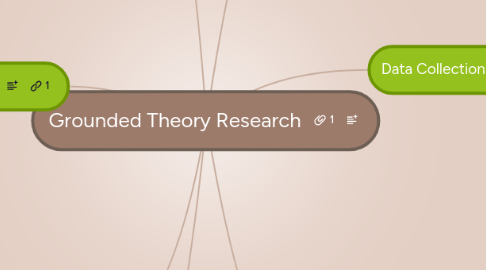
1. Theoretical Underpinnings
1.1. Field of study
1.2. Positivist
1.3. Social Constructivist
1.4. Internal divisions
1.5. Seminal Researchers
1.6. Role of literature reviews
2. Critics' Assertions
2.1. Preconceptions
2.2. Category saturation
2.3. Internal differences
3. Key Researchers
3.1. Anselm Strauss
3.1.1. Published "The Discovery of grounded theory" with Glaser in 1967
3.1.2. Often worked with Juliet Corbin
3.1.3. Eg. Corbin & Strauss, 2008
3.2. Barney Glaser
3.2.1. Developed classic grounded theory with Strauss
3.2.2. Founded the Grounded Theory Institute
3.2.3. Often works with Judith Holton
3.2.3.1. Editor-in-chief of Grounded Theory Review
3.2.4. Eg. Glaser & Holton, 2004
3.3. Kathy Charmaz
3.3.1. Developed constructivist Grounded Theory
3.3.2. Eg. Charmaz, 1990
3.4. Antoinette McCallin
3.4.1. Uses classic grounded theory
3.4.2. Contributor and reviewer of Grounded Theory Review
3.4.3. One of 13 researchers of Grounded Theory Online
3.4.4. Eg. McCallin, 2011
4. References
4.1. Butterfield, 2009
4.2. Charmaz, 1990
4.3. Corbin & Strauss, 2008
4.4. Creswell, 2007
4.5. Givon & Court, 2010
4.6. Glaser & Holton, 2004
4.7. Glaser & Strauss, 1967
4.8. McCallin, 2011
4.9. Smart & Igo, 2010
5. Research Purposes and Questions
5.1. Use
5.2. Purposes
5.3. Questions
6. Data Collection and Analysis
6.1. Systematic procedure
6.1.1. Is this methodology right for the research question?
6.1.2. Theoretical sampling
6.1.3. Open coding
6.1.3.1. Go to the field
6.1.3.2. Go to the office
6.1.3.3. Go back to the field
6.1.3.4. Go back to the office
6.1.4. Axial Coding
6.1.4.1. Axial coding paradigm
6.1.4.2. Comparative method of analysis
6.1.4.2.1. Go back to the field
6.1.4.2.2. Go back to the office
6.1.5. Selective coding
6.1.6. Articulation
6.1.7. Conditional Matrix (optional)
6.1.8. Examples
6.1.8.1. "A Grounded Theory of Behavior Management Strategy Selection, Implementation, and Perceived Effectiveness Reported by First-Year Elementary Teachers" by Smart and Igo (2010)
6.1.8.2. "Coping strategies of high school students with learning disabilities" by Givon and Court (2009)
6.1.8.3. "Moderated guiding: a grounded theory of nursing practice in end-of-life care" by McCallin (2011)
6.2. Constructivist Grounded Theory
6.2.1. Characteristics
6.2.2. Procedure
6.2.3. Examples
6.2.3.1. "'Discovering' chronic illness: Using grounded theory" by Charmaz (1990)
6.2.3.2. "Using grounded theory and action research to raise attainment in, and enjoyment of, reading" by Butterfield (2009)
